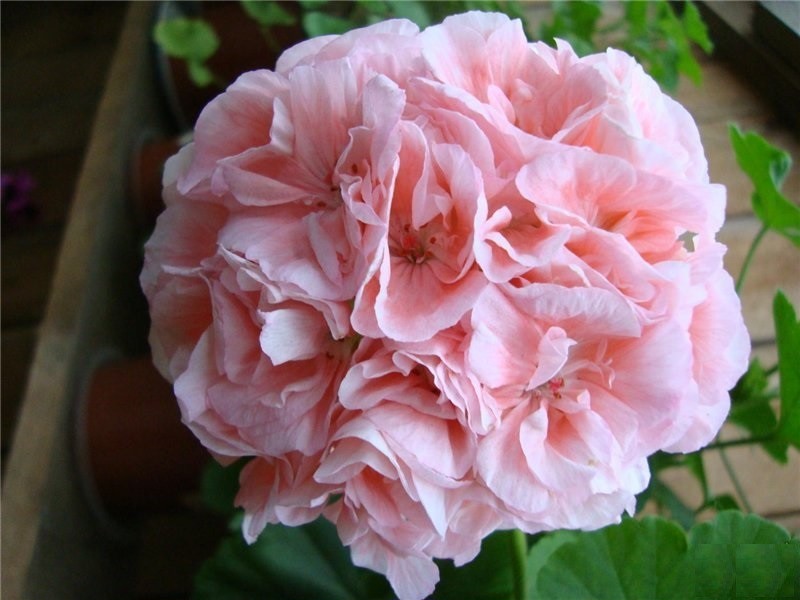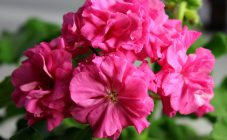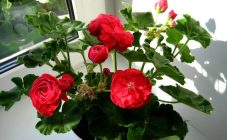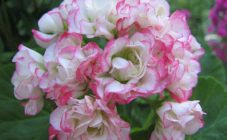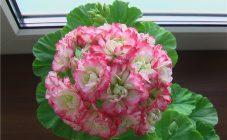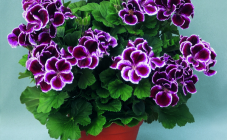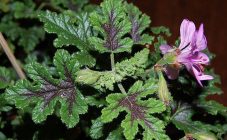Pelargoniums are plants of the geranium family that are cultivated for their bright colors. About 250 species are now known. An interesting representative is Pac Salmon Komtess pelargonium. It is grown both at home and outdoors.
Variety history
Pelargoniums come from South Africa. Unusual flowers interested seafarers and in the 16th century they were brought to Europe. Scientists have carried out breeding work and developed new unpretentious species.
Pelargonium Salmon Comtesse is a hybrid variety obtained from the German nursery PAC Elsner. The organization specializes in plant breeding for landscaping cities, streets, buildings. The resulting specimens are distinguished by their beautiful appearance and resistance to adverse factors.
Description of the plant
Pelargonium Pak Salmon Comtesse is one of the most luxurious undersized varieties.
Botanical signs:
- height 25-35 cm;
- the bush is harmoniously folded, looks elegant, does not stretch;
- leaves are dark green;
- inflorescences - umbrellas on vertical pubescent peduncles;
- flowers are large, double, pale pink in color.
Pelargonium grows well outdoors in summer. It can withstand frosts down to -7 ° С.
Other varieties are included in the PAC line. Most Popular:
- Salmon Queen is a compact bush with large double flowers of a delicate peach color;
- Night Salmon - has brown leaves with a thin green edging. Salmon flowers, collected in large inflorescences;
- Salmon Princess - double creamy white champlevé flowers;
- Pelargonium Pop Idols Salmon - appeared recently, compact mini-plant. The flowers are bright salmon.
Growing features
A sunny place is allocated for pelargonium. When growing a house, the pot is placed on the south or southeast side. If this is not possible, additional lighting is organized. In the bright sun, the bushes are slightly shaded to avoid burns.
The culture is planted in loose fertile soil. Approximate composition:
- leafy land;
- coarse sand;
- charcoal;
- peat.
The optimal proportion is 3: 1: 1: 1. Layout in the garden - 35 × 35 cm.
Boarding time:
- at home - February-November;
- on a balcony or in a flower garden - after the establishment of stable warm weather.
Culture care consists in:
- watering;
- top dressing;
- pruning.
Top dressing is carried out twice:
- at the beginning of the season - nitrogen-containing fertilizers for the development of green mass;
- before flowering - potassium and phosphorus to form more flowers.
Pelargonium grows rapidly, so pruning is periodically carried out. If this is not done, flowering will be poor and short-lived. To make the bush grow in width and not in height, pinch the top.
The optimum temperature for development is + 17 ... + 23 ° С. In winter, the plant goes into a resting phase to gain strength for flowering next season. When grown outdoors, it is better to dig it up and bring it home so that it does not freeze out. In regions with warm climates, it is permissible to leave it outdoors under cover.
In winter, the temperature at home is reduced to + 13 ... + 15 ° С. At this time, the plant is not fed or watered. In the spring it will wake up and begin to bloom again.
Pelargonium Pak is propagated by cuttings, like other flowers.With the seed method, varietal qualities are not inherited.
Advantages and disadvantages
Pelargonium variety Salmon Komtess has such advantages as:
- excellent decorative qualities;
- long and abundant flowering;
- ease of care.
Flower growers appreciate pelargonium not only for its beauty, but also for its medicinal properties. The plant disinfects the air. Its aroma soothes the central nervous system, normalizes sleep, relieves fatigue.
There is only one drawback - a fairly high price. The average cost of a rooted cuttings is 500 rubles.
Pelargonium Pac Salmon Komtess is a beautiful and unpretentious flower, it is not at all difficult to grow it.
